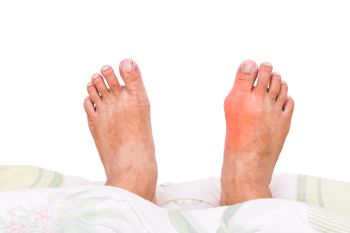Call Us Today! (203) 975-9600
SAME DAY APPOINTMENTS AVAILABLE
What Is Causing My Painful Bunion?
Monday, 14 December 2020 00:00 Bunions are a very common foot condition that cause a bony lump to form at the main joint of the big toe. This occurs when the joint is pulled out of alignment because the big toe is turned towards the rest of the toes. While bunions may not cause pain or symptoms at first, they can eventually push the other toes out of alignment making it difficult to wear shoes or walk. Bunions even have a tendency of causing skin irritation as the shoes rub against the affected area. Bunions can be caused due to inherited defects in the foot structure, wearing poorly fitted shoes, arthritis, conditions that damage the nerves in the feet, and of course injuries. If you are suffering from a painful bunion, consulting with a podiatrist for pain relief methods is highly suggested.
Bunions are a very common foot condition that cause a bony lump to form at the main joint of the big toe. This occurs when the joint is pulled out of alignment because the big toe is turned towards the rest of the toes. While bunions may not cause pain or symptoms at first, they can eventually push the other toes out of alignment making it difficult to wear shoes or walk. Bunions even have a tendency of causing skin irritation as the shoes rub against the affected area. Bunions can be caused due to inherited defects in the foot structure, wearing poorly fitted shoes, arthritis, conditions that damage the nerves in the feet, and of course injuries. If you are suffering from a painful bunion, consulting with a podiatrist for pain relief methods is highly suggested.
If you are suffering from bunion pain, contact one of our podiatrists of Preferred Footcare, LLC. Our doctors can provide the care you need to keep you pain-free and on your feet.
What Is a Bunion?
Bunions are painful bony bumps that usually develop on the inside of the foot at the joint of the big toe. As the deformity increases over time, it may become painful to walk and wear shoes. Women are more likely to exacerbate existing bunions since they often wear tight, narrow shoes that shift their toes together. Bunion pain can be relieved by wearing wider shoes with enough room for the toes.
Causes
- Genetics – some people inherit feet that are more prone to bunion development
- Inflammatory Conditions - rheumatoid arthritis and polio may cause bunion development
Symptoms
- Redness and inflammation
- Pain and tenderness
- Callus or corns on the bump
- Restricted motion in the big toe
In order to diagnose your bunion, your podiatrist may ask about your medical history, symptoms, and general health. Your doctor might also order an x-ray to take a closer look at your feet. Nonsurgical treatment options include orthotics, padding, icing, changes in footwear, and medication. If nonsurgical treatments don’t alleviate your bunion pain, surgery may be necessary.
If you have any questions, please feel free to contact our office located in Stamford, CT . We offer the newest diagnostic and treatment technologies for all your foot care needs.
Call Us Today! (203) 975-9600
SAME DAY APPOINTMENTS AVAILABLE








